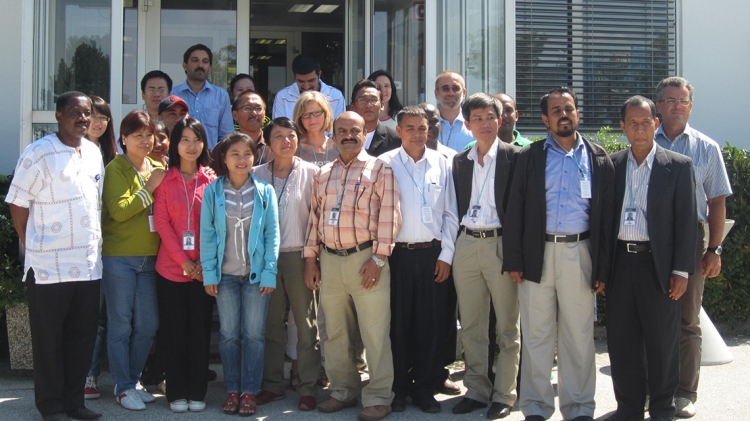The first group fellowship provided by the IAEA on the use of isotopic and nuclear techniques for soil and water management has come to a successful end on 17 August 2012. The four week fellowship programme included participation in a one week international symposium on ‘Managing Soils for Food Security and Climate Change Adaptation and Mitigation’, followed by three weeks of intense training on the use of isotopes to understand soil-water-crop processes and identify strategies to enhance crop productivity. During the three weeks of group training, participants improved their skills, knowledge and technical capacity in the management of soil, water, crops and nutrients in agriculture.
Supported by the Japanese contribution to the IAEA’s Peaceful Uses Initiative (PUI), the group fellowship training brought together a total of 20 scientist and technical personnel from 16 different countries in the Asia and the Pacific region. It is the first time that the IAEA has offered such fellowship training in a group setting. Participating countries included Afghanistan, China, Indonesia, Islamic Republic of Iran, Cambodia, Lao PDR, Malaysia, Myanmar, Nepal, Oman, Pakistan, Philippines, Palau, Sri Lanka, Viet Nam and Yemen.
“The group fellowship is an efficient training method for many countries to absorb the knowledge of the IAEA at one place and one time”, explained Ho-Seung Lee, Programme Management Officer at IAEA. “Our goal was to optimize the impact of the fellowship training by creating an environment where fellows could share their experiences and establish networks through cooperation between their countries”, he continued.
The fellows were enthusiastic about the new integrated training approach. It offered them an opportunity to exchange knowledge and skills with each other, and keep up-to-date with new techniques and methods of managing soil and water in a sustainable manner.
“During my fellowship, I learned modern isotope techniques that can be used to help solve problems in our countries related to drought, water shortage, soil and water salinity or soil erosion” said Ms. Rivera, a fellow from the Philippines. “I was able to discuss these problems with other fellows and find out what others do in their countries to address them. Now, when I go back to my country, not only will I be able to apply the techniques I learned from the IAEA lecturers, but also use the lessons learned from other fellows.”
The first group fellowship training was held within the framework of the IAEA’s technical cooperation project, RAS/5/064, on “Enhancing Productivity of Locally-underused Crops through Dissemination of Mutated Germplasm and Evaluation of Soil, Nutrient and Water Management Practices.”



